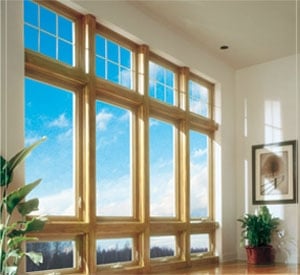
Q: I’ve been struggling with a decision about my old wood windows. Some won’t close properly, and I suspect there’s lead paint under the layers. Are vinyl windows really more efficient than wood?
A: That’s a fantastic question—and one we hear often, especially here in New England where older homes are the norm.
Not only are many homeowners concerned about lead paint, but restoring old wood windows is a massive undertaking. You’d have to remove each window, strip it down, re-glaze, re-prime, repaint, and then reinstall. Worse yet, some of those windows may still not function properly afterward. It’s exhausting just thinking about it!
Of course, you could purchase new wood windows—but is that really the best option?
Why Wood Windows Are Becoming a Thing of the Past
Over the last two decades, wood windows have dropped from nearly 50% of the market to just around 25%. So, what replaced them?
➡️ Vinyl windows.
The reasons are clear: lower maintenance, better energy efficiency, and realistic woodgrain finishes have made vinyl the go-to choice for most homeowners today.
Let’s break it down further:
🧽 Maintenance: Vinyl Wins the Long Game
Wood windows require scraping and repainting every few years to protect against harsh weather—especially here in New England. Skip that routine, and you risk voiding your warranty, which is often at the manufacturer’s discretion.
➡️ Vinyl windows, on the other hand, require little to no maintenance and never need painting. They look great—and stay that way—with minimal effort.
🎨 Color and Aesthetic Options: Modern Vinyl Has Evolved
Today’s vinyl windows offer beautiful, durable, and realistic woodgrain finishes—far removed from the plastic look of vinyl in the 1980s and 90s.
For example, our windows at Coastal can:
Match any Sherwin-Williams exterior shade
Include a factory-finish warranty
Deliver that classic wood look without the upkeep
💪 Strength and Durability: Vinyl Stays Strong for Life
Unlike wood, vinyl doesn’t:
Pit, peel, or chip
Rot or warp due to moisture
Attract termites or suffer from corrosion
High-quality 100% virgin vinyl holds up against salt air, pollution, and daily use—year after year.
By contrast, wood windows are mechanically fastened at the corners, which makes them prone to gaps, drafts, and long-term deterioration.
🌡️ Energy Efficiency: The Numbers Don’t Lie
R-Factor (heat resistance) for wood: About 1 per inch
R-Factor for our vinyl windows: Around 7 per inch
That’s 7 times more efficient than wood!
When paired with low-E coatings and Energy Star certification, vinyl windows significantly reduce air leaks—cutting energy bills by up to 40%.
💰 Cost Savings: Vinyl Is More Budget-Friendly
Vinyl windows are generally 30–50% less expensive than their wood counterparts. That’s a major advantage if you’re replacing multiple windows—or planning a full home renovation.
📈 Resale Value: Vinyl Outperforms Wood
According to Remodeling Magazine’s 2016 Cost vs. Value Report, in New England:
Vinyl windows recoup ~77.5% of their cost
Wood windows recoup ~72%
Clearly, vinyl offers a higher return on investment.
🔐 Security: Vinyl Provides Better Protection
Older wood windows often suffer from warped frames and broken locks, making them difficult—or impossible—to secure properly. Vinyl windows, on the other hand, feature modern locking systems and tight seals that help protect your home and family.
🛡️ According to the National Crime and Prevention Council, windows and doors are the most vulnerable points for home intrusions.
✅ Bottom Line: Vinyl Windows Are the Smarter Choice
From cost and comfort to style and security, vinyl windows clearly outshine their wood counterparts. They offer all the beauty of wood—with none of the headaches.
Still Unsure Which Is Right for You?
We’re happy to walk you through your options.
📧 Email Stephanie at svanderbilt@mycoastalwindows.com
📞 Or call 978-304-0495 for a free consultation
Whether you’re deciding between wood and vinyl or just want expert guidance, we’re here to help.




